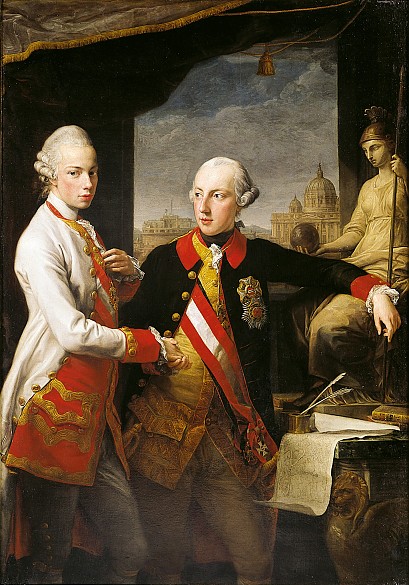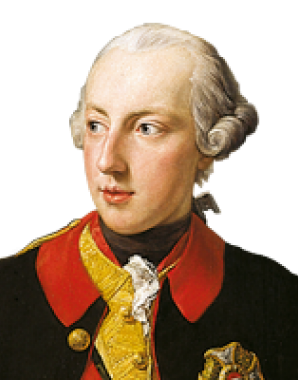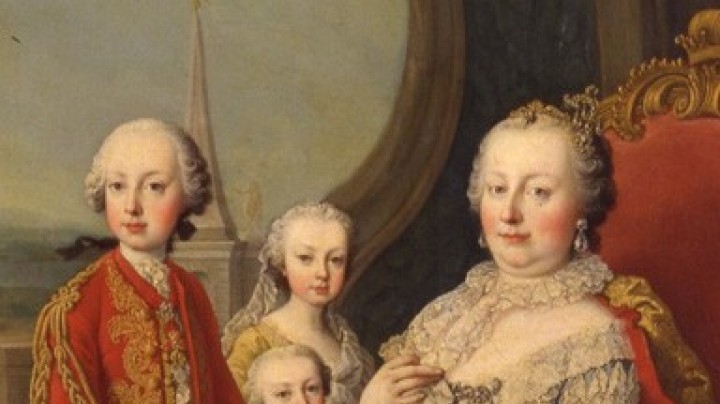Pietro Leopoldo, Grand Duke of Tuscany
Together with his new bride the young regent travelled to Florence, equipped with a detailed set of instructions or ‘catalogue of deportment’ supplied by his mother. As a member of the imperial dynasty he was responsible to his eldest brother Joseph, who regarded Tuscany as an outpost of the Austrian Monarchy and Leopold as a representative of Habsburg interests.
Aged only eighteen, the new grand duke, supported by a group of advisors, soon set about implementing a large-scale programme of reforms which was to make Tuscany a leading example of Enlightenment rule.
The young grand duke based his reforms on the principles of physiocracy. The main tenet of this school of economic thought was to strengthen agriculture in order to support systematic population growth which would in turn lead to an increase in economic power. Accordingly, controls on trade in grain were abolished along with a range of feudal constraints, and the property rights of peasant landholders were strengthened. All of this was intended to generally improve and fortify the situation of the peasantry. New areas for cultivation were obtained, for example by draining the marshes of the Maremma. This was accompanied by the introduction of the latest methods in arable farming and animal husbandry.
Incentives for trade were also created with the abolition of the restrictions of the medieval guild system and the standardization of tariffs and duties.
Another important feature of the grand duke’s programme was the reform of taxation, with the abolition of the system of tax farming, which had led to injustices and fraud. This was accompanied by statistical surveys so that reliable data were available to give an accurate picture of the duchy’s economic situation.
A new municipal code was implemented to promote the self-administration of the municipalities. The duchy’s inhabitants were to be encouraged to develop a sense of themselves as citizens rather than subjects without any rights, a change symbolized by the abolition of the army, which was replaced by a citizens’ militia for purely defensive purposes.
Over something less than two decades Tuscany was transformed from a stagnating minor state living off the remnants of its erstwhile importance as the centre of the Renaissance into a modern territorial state with a pioneering role in Enlightenment Europe.
There is a clear similarity here with the aims of the archduke’s brother in Austria. However, in implementing his reforms Leopold proceeded with more caution and less haste. He took into account pre-existing structures, thus winning broader support for his programme of modernization. In contrast to the rather despotic style of Joseph II, who tended to decree his measures from above, Leopold was always concerned to involve local interest groups, whether they were aristocratic estates or municipalities.
In 1778 Leopold travelled to Vienna on the invitation of his mother, who hoped to co-opt him as an ally against her co-regent Joseph. During his stay at the Viennese court he obtained sobering insights into the deadlocked situation and the conflicts within the family, which he recorded in personal memoranda. His observations, which he wrote in a secret Italian shorthand under the title of Stato della famiglia, today constitute an important source for historians.
A conflict soon developed with the emperor, who had summoned Leopold’s eldest son Franz to Vienna in order to groom him as his successor, since it was more than likely that Joseph would remain childless. Joseph was also planning to incorporate Tuscany into the empire as a whole, forcing Leopold to promise that after his death the territory would revert to the main line of the dynasty. However, as soon as Leopold succeeded his brother on the throne, he revoked this agreement and his son Ferdinand assumed the regency in Tuscany.
Joseph also prevented the adoption of the constitution for Tuscany that Leopold had had drawn up. The draft contained provisions to enhance the self-administration of the estates, as well as the emancipation of the peasants from feudal overlordship and the abolition of censorship. This revolutionary plan was a step too far for his imperial brother, who feared that it would set an undesirable precedent.
One of Leopold’s successes was the implementation of the new criminal code in 1786, which abolished the death penalty and torture. The enlightened concept of law that underlay this code is also evident in the generally lenient penalties and the fact that it did not include the crime of lèse-majesté.














